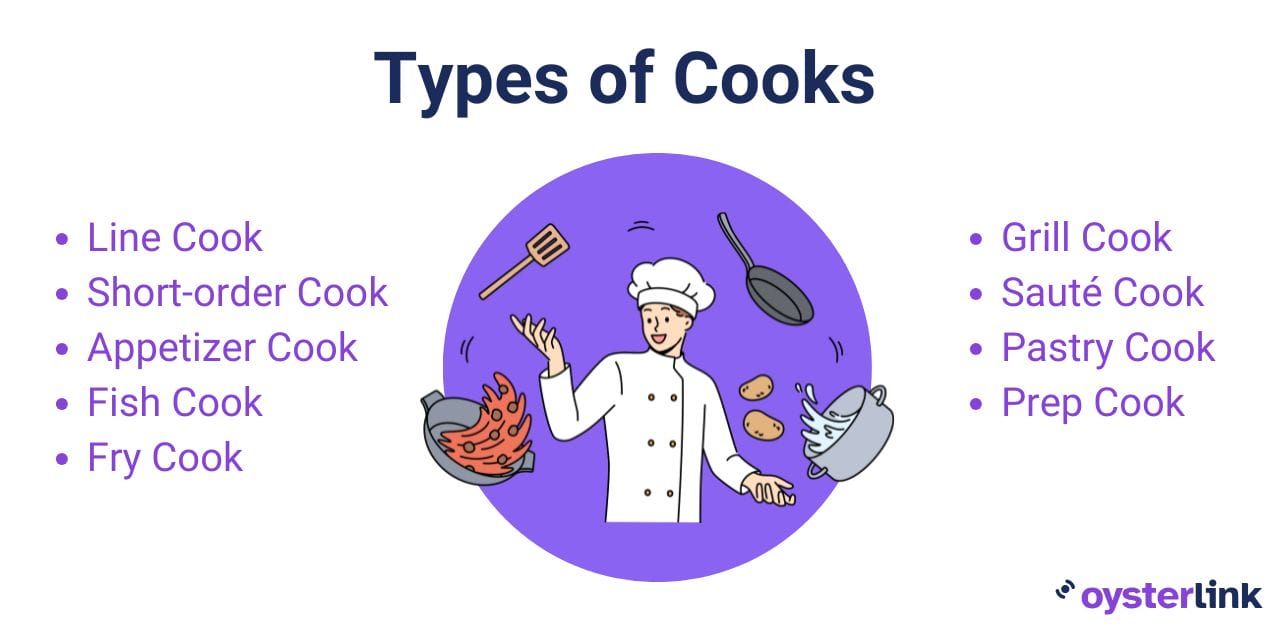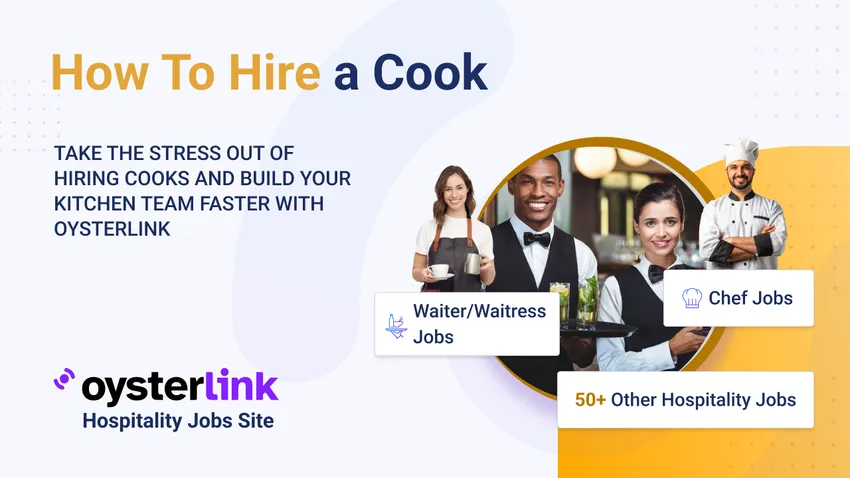Knowing how to hire a Cook is key to ensuring food quality, consistency and a smooth kitchen workflow.
This six-step guide will help you find and retain the right Cook for your restaurant or hotel.
What To Know Before You Hire a Cook
The first step is to identify the type of Cook you need, as the role can vary significantly depending on the size of the restaurant.
If you're a larger dining establishment, you may follow the hierarchy in a commercial kitchen.
However, in a more intimate setting, your Cook may be cross-trained to handle a range of responsibilities.
Here's a look at the different types of Cooks.
Line Cook
A Line Cook is responsible for preparing dishes. This includes washing ingredients, plating meals and ensuring the food is cooked properly.
They report to a Chef, Head Chef or Sous Chef in restaurants that follow traditional kitchen hierarchy or fine dining establishments.
In more casual, smaller operations, they work under the supervision of a Kitchen Manager.
Short-order Cook
A Short-order Cook typically works at quick-service restaurants. They prepare quick-to-cook food like burgers, fries and sandwiches.
The role demands speed and efficiency, as orders often come in high volume.
Appetizer Cook
An Appetizer Cook specializes in preparing the starter dishes for a meal. This role focuses on creating smaller plates, such as soups, salads and bruschetta.
Fish Cook
A Fish Cook specializes in preparing seafood. They are knowledgeable about different cooking methods for fish, including steaming, frying and baking.
Fry Cook
A Fry Cook is responsible for preparing foods that are deep-fried or shallow-fried. This includes dishes like fried chicken, calamari or onion rings.
Fry Cooks are skilled in maintaining the right oil temperature for optimal results.
Grill Cook
A Grill Cook is responsible for cooking items on the grill, such as meats, poultry and vegetables.
This role requires knowledge of grilling techniques, proper timing and temperature control to ensure that grilled items are cooked properly.
Sauté Cook
A Sauté Cook cooks food quickly in a hot pan with a small amount of fat or oil, often for dishes like stir-fries, pasta sauces or seared meats.
They also create sauces by deglazing the pan with wine, stock or another liquid, capturing the rich browned juices for added flavor.
Pastry Cook
A Pastry Cook specializes in the preparation of desserts, pastries and other baked items.
Pastry Cooks typically report to a Pastry Chef, who oversees dessert production and maintains the quality of all baked goods.
Prep Cook
A Prep Cook assists with the preparation of ingredients before the start of service.
This includes chopping vegetables, marinating meats and ensuring that everything is organized and ready for the others during busy service hours.
Prep Cooks may also be responsible for cleaning and maintaining the kitchen.

Understanding the specific needs of your restaurant will guide you in choosing the right Cook for your team.
Whether you're looking for a multi-skilled cook or a specialist in one station, this clarity will help you tailor your hiring strategy.
Write an Effective Cook Job Description
Once you've identified the type of Cook you need, it's time to write a job description.
When writing a job description, there are two main scenarios to consider:
Hiring for a new business
If you're opening a new restaurant, you'll need a job description that is broader to accommodate the evolving nature of the role.
This allows flexibility in the tasks and responsibilities, as the kitchen environment may still be developing.
Hiring to replace a resigning Cook
For a resigning Cook, the job description should focus on specific tasks.
The goal is to maintain continuity and find someone who can seamlessly blend into the current team without disrupting the operation.
Emphasize experience and efficiency, ensuring that the new Cook can quickly adapt to established workflows and systems for a smooth transition.
Hire a Cook by Advertising the Job Effectively
Reaching a wide pool of candidates is essential to finding the right Cook, and there are several strategies you can use to ensure maximum exposure.
Culinary schools
Culinary schools are ideal if you're looking for entry-level Cooks. Recent graduates bring dedication, a solid foundation in cooking techniques and culinary passion.
Hiring from these schools means you'll find candidates eager to develop their skills and contribute to your kitchen’s success.
Job boards
Posting your job opening on a mix of general and industry-specific job boards can help you reach a wider and more relevant pool of candidates.
General platforms like Indeed, Glassdoor and ZipRecruiter attract job seekers from many backgrounds, including those looking to move into the culinary or hospitality industry.
At the same time, niche job boards such as Poached Jobs, Hcareers and Culinary Agents are designed specifically for restaurant and hotel roles, making it easier to connect with experienced hospitality professionals.
OysterLink is another hospitality-focused platform where you can post restaurant jobs at a low cost.
It also offers free resources like interview questions and customizable job descriptions to support you throughout the hiring process.
Social media
Use social media platforms such as Facebook, Instagram and LinkedIn to expand the reach of your job opening.
Many candidates actively seek employment opportunities on these platforms, and the visual nature of social media can also showcase your establishment’s culture, which can help attract the right fit.
Referrals
Ask your current staff for recommendations. Employee referrals are often one of the best ways to find reliable candidates who will fit seamlessly into your team.
Offer incentives to encourage your team to participate in the hiring process.
Hire from within
Many people say that the best Cooks start as Dishwashers. By promoting from within, you can tap into your existing team and offer growth opportunities.
A hardworking Dishwasher or team member already understands the kitchen environment and is often eager to learn new skills.
This approach not only boosts morale but also builds loyalty, as employees feel valued and are motivated to contribute to the restaurant’s success.
Staffing agencies
Staffing agencies that specialize in the hospitality industry can help you quickly fill open Cook positions.
They often have access to a pool of qualified candidates who may not be actively looking but are open to new opportunities.
Interviewing Tips To Help You Hire a Cook
When interviewing candidates, it’s essential to assess not only their technical skills but also their ability to work in your specific kitchen environment.
Here are some key things to look for during interviews:
- Willingness to learn: Prioritize candidates who are eager to improve their skills and learn new techniques, even if they don't have extensive experience.
- Ability to handle pressure: Kitchens are high-pressure environments, and Cooks need to thrive under stress. Ask about their previous experiences in fast-paced kitchens and how they handle tight deadlines.
- Organizational skills: A good Cook must have the capacity to keep an organized kitchen, manage their station efficiently and ensure that orders are completed on time.
- Creativity and adaptability: Look for candidates who have the creativity to create new dishes and the ability to adapt food according to dietary needs while maintaining quality.
- Teamwork and communication: The best Cooks are those who can work well with others. Assess whether the candidate has the ability to make a positive impact on the team, is personable, open to constructive feedback and can communicate effectively with the rest of the team.
Initial impressions have been scientifically proven to be accurate when forming conclusions about people.
So, take your initial impression of the candidates into consideration when assessing them.
Offer a Paid Stage Shift Before You Hire a Cook
A stage shift allows you to observe how the candidate handles pressure, maintains organization and efficiently manages tasks.
It's also an opportunity to see how they collaborate with the team — are they focused on the job or do they easily get distracted?
Pay attention to how they respond to unforeseen challenges.
For example, if there’s a sudden shortage of a key ingredient, do they immediately suggest a solution or do they seem flustered and unsure of how to proceed?
Extend an Offer and Onboard Your Cook
After identifying the right candidate, promptly extend an offer and begin the training process. Make sure the offer is clear, including details about pay, benefits and schedule.
Training should be thorough and tailored to the Cook’s experience and learning pace to set your new hire up for success.
59% of employees surveyed said proper training boosts job performance, which highlights the value of investing time in the onboarding process.
Provide hands-on training that covers everything from cooking techniques and kitchen safety to how your team communicates during service.
How To Hire a Cook and Keep Them From Leaving
Once you’ve hired and onboarded your ideal Cook, continue working to keep them satisfied by creating an environment where they feel valued and supported.
While offering competitive pay and comprehensive benefits is a good start, fostering a positive work culture will help maintain a healthy work-life balance and reduce burnout.
A strong culture goes a long way in keeping employees on board, reducing turnover and contributing to the success of your business.










Loading comments...